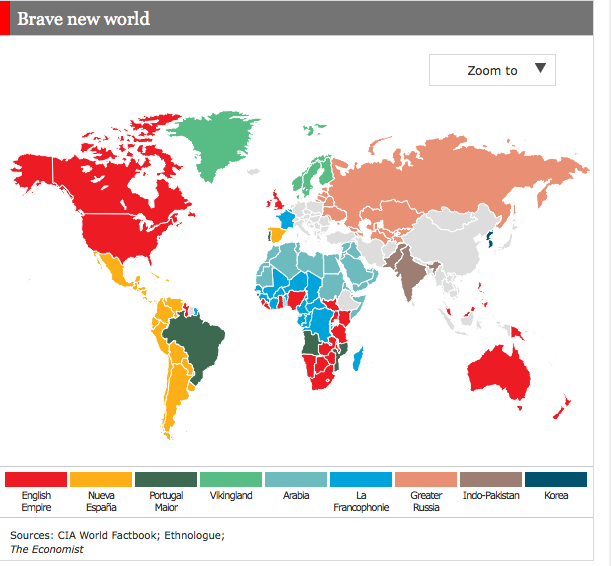Territorial rights for languages
« previous post | next post »
 I had been waiting for the world's media to notice the extraordinarily anomalous character of Vladimir Putin's notion that he can annex pieces of land simply because speakers of the Russian language live there and are feeling aggrieved or imperilled. And now The Economist has done the job very nicely. See this page for an article about what the world map would look like under a generalization of Putin's doctrine.
I had been waiting for the world's media to notice the extraordinarily anomalous character of Vladimir Putin's notion that he can annex pieces of land simply because speakers of the Russian language live there and are feeling aggrieved or imperilled. And now The Economist has done the job very nicely. See this page for an article about what the world map would look like under a generalization of Putin's doctrine.
Basically a very large part of the world ends up getting divided between the English Empire (all of the British Isles, North America, Australasia, Nigeria, and eastern and southern Africa), Nueva España (Spain, Central America and all of the western side of South America), Portugal Maior (Portugal, Brazil, Angola, and Mozambique), Vikingland (Scandinavia and Greenland), Arabia (everything from Western Sahara to the Persian Gulf), La Francophonie (France and a lot of western and central sub-Saharan Africa — The Economist controversially omits Quebec), Indo-Pakistan (all of South Asia), and Greater Russia (Putin's empire under his most grandiose dreams).
Korea, of course, gets unified; China stays almost exactly the same as it is now; so do many other countries, including some big ones (Indonesia, Iran, Mongolia, Myanmar, Turkey, Thailand) and many small ones. Switzerland would have to disappear completely, clearly, but new nations like Basqueland and Kurdistan would obviously have to arise.
The idea is, of course, political lunacy. Whoever started the reunification of India, Pakistan, and Bangla Desh would probably be creating a nuclear war rather than a peaceful Hindi-Urdu-speaking friendship zone. And one by one the speakers of smaller languages (the vast majority of the roughly 7,000 languages on the planet) would start declaring independence or seizing pieces of their neighbours' land (Russia could well lay claim to certain select parts of London: the UK now has more billionaire residents than any other country, and quite a few are Russians living in Mayfair and Chelsea and Knightsbridge).
But the thought experiment does underline the utter madness entailed by Putin's idea that the battles for ethnic and national minority rights that have caused the deaths of so many millions in so many horrible civil wars might now be extended to allocate territory to people who merely maintain a specific language as their preferred medium of daily conversation. As Donetsk and Luhansk in the eastern Ukraine vote today on becoming independent people's republics, in referenda both organized and tabulated by pro-Russian militants, the Economist's mordant contribution could hardly be more timely.